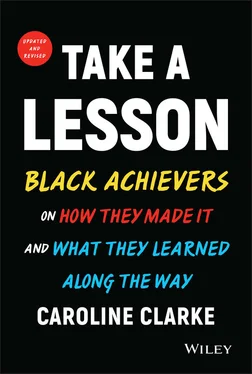I applied to Harvard because I realized I knew no one, I had very limited pedigree, and I had no safety net. Even though people were being kind and telling me I had potential, I needed external validation from a brand name.
Then I was deferred: HBS basically told me to get a couple years of work experience. During that time, I had an amazing mentor: Dr. Jennifer Montana, a PhD from Harvard who had her own economic development consulting company. I met her at a business incubator that I was affiliated with in college.
She tells the story that I came up to her and said something like, “I want to go to Harvard, but I don't know how. Teach me.” She spent countless hours reviewing my application, reviewing my résumé, giving me tips and tricks, and eventually co‐signing me and blasting my résumé to 40 of her friends, one of whom was the chief research officer at Forrester [Research]. And that's how I ended up going from a Christian college in Fort Wayne, Indiana, loading all my stuff in a rented van, and driving 13 hours to Cambridge, having not really known what Forrester was until that moment she connected me with them.
While I was at Forrester, HBS connected me with several other African Americans, one of whom was in the school at the time. I remember going to drinks with him and three or four other folks, and having this “aha” moment. Some article had come out about the number of African Americans in corporate America in senior roles, and I remember saying, “If it's not us, who is it going to be? We are the ones who have been privileged enough to be going to this school.”
Basically, I told my friends at the table, “We don't have the option to settle for a white picket fence. We have to swing for the fences and become captains of industry so that we can break down the doors of opportunity for those who haven't had the lucky breaks we have had.”
One of the questions that is always out there is about the level of ambition, and is it relative or is it absolute? From a relative perspective, it can be tempting to have a feeling of having made it when certain trappings of conventionally accepted success have occurred. And yet, I think that those of us who have been in privileged positions have an obligation to find the biggest megaphone that we can to pay that forward. It doesn't mean that you always have that megaphone on. In some cases, you're just building to get a bigger megaphone.
I think it's part of why I've spent most of my career in mission‐oriented companies, whether eBay with its sort of economic empowerment for sellers or Upwork, enabling individuals to build their careers through the platform. What we do in disrupting the old paradigms of how people work, who they know, where they come from, and using a platform to do it, parallels my own journey in some very resonant ways. I hope that the work that we do enables folks to have access to more economic opportunities. And if I'm in a position to enable that, I think that makes the world a fairer, more just, more inclusive place.
Nobody tells you the things that you actually need to know to be successful. You kind of stumble into those over the course of time. And yet, technology has a massive role to play in demystifying that information, creating access, leveling the playing field, and helping to do those things at scale. That's part of what inspires me and how I approach things, especially now that I have a family of my own. I realize there are other ways to serve beyond the pulpit, and that gives you a different sense of purpose, and a different sense of hope.
Over the past 15 years, I've oriented my career from the perspective of, How can I be in the rooms that will help people who look like me progress? How can I make my otherness less of an outlier?
There's a weekly number of hours that I spend just being Black, as an executive. Every time a person of color—especially in a leadership position—is thinking about joining a company that I've worked at, I get a call. Every time someone's thinking about recruiting a person of color that is even several degrees removed from me, I get a call. As I've been in more and more fortunate positions, there are more inbounds for mentoring opportunities, coffee chats, making connections for folks to break into careers or be introduced to sponsors of mine, or get coached on how to interview or even give speeches to people of color in different forums and at different levels of openness and engagement, to share what's the real of what's happening. I've tried to be thoughtful about how I use those moments.
I've learned that, in spite of my discomfort at times, bringing my whole self to a position means that some of those [internal] barriers need to come down. In a prior role, I used to write a weekly Slack post, and one of the hardest posts I ever had to write was in the middle of the George Floyd protests. People [expressed] surprise that I was engaging on such a deeply personal level and sharing what it meant not only for me but the fears I had for my infant son.
Leading up to the pandemic, I had a string of losses and major life events. My mom passed very quickly from cancer in 2016. Then, between May 2019 and January 2020, I got married, my wife moved in, my role expanded at work, I joined the Smithsonian National Postal Advisory board, I bought a house, my role expanded a second time, we moved cities, we found out we were pregnant, and my dad passed away at the end of 2019. We were still estranged.
All those things help you feel a different sense of your own mortality and change your time horizons. Combined with all we went through during COVID, it made me think, every day we're writing a line in our obituary, and we think that we have much longer to write those lines than we might.
In my whole life, as the youngest, I've always been looking forward to the next achievement. I used to tell folks to wait 'til you get to the corner office before you don the dashiki. But you and I have a voice, we have real influence, right now. We have ways that we can help contribute to the tide of justice, today. I can't say that I'm ever going to be fully comfortable, because I can't change the fact I'm a private person in general. And yet I am picking my moments, more and more, to be more vocal, because I don't want to waste the platform that I have, even as I'm seeking to grow it.
Конец ознакомительного фрагмента.
Текст предоставлен ООО «ЛитРес».
Прочитайте эту книгу целиком, купив полную легальную версию на ЛитРес.
Безопасно оплатить книгу можно банковской картой Visa, MasterCard, Maestro, со счета мобильного телефона, с платежного терминала, в салоне МТС или Связной, через PayPal, WebMoney, Яндекс.Деньги, QIWI Кошелек, бонусными картами или другим удобным Вам способом.











